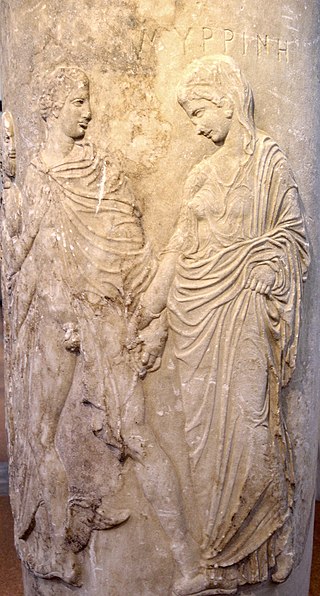Related Research Articles
The history of religion refers to the written record of human religious feelings, thoughts, and ideas. This period of religious history begins with the invention of writing about 5,200 years ago. The prehistory of religion involves the study of religious beliefs that existed prior to the advent of written records. One can also study comparative religious chronology through a timeline of religion. Writing played a major role in standardizing religious texts regardless of time or location, and making easier the memorization of prayers and divine rules. A small part of the Christian Bible involves the collation of oral texts handed down over the centuries.
Religion is a range of social-cultural systems, including designated behaviors and practices, morals, beliefs, worldviews, texts, sanctified places, prophecies, ethics, or organizations, that generally relate humanity to supernatural, transcendental, and spiritual elements—although there is no scholarly consensus over what precisely constitutes a religion. Different religions may or may not contain various elements ranging from the divine, sacredness, faith, and a supernatural being or beings.

Psychopomps are creatures, spirits, angels, demons or deities in many religions whose responsibility is to escort newly deceased souls from Earth to the afterlife.

Johann Georg Hamann was a German Lutheran philosopher from Königsberg known as "the Wizard of the North" who was one of the leading figures of post-Kantian philosophy. His work was used by his student J. G. Herder as the main support of the Sturm und Drang movement, and is associated with the Counter-Enlightenment and Romanticism.
Fazlur Rahman Malik, commonly known as Fazlur Rahman, was a modernist scholar and Islamic philosopher from today's Pakistan. Fazlur Rahman is renowned as a prominent liberal reformer of Islam, who devoted himself to educational reform and the revival of independent reasoning (ijtihad). His works are subject of widespread interest and criticism in Muslim-majority countries. He was protested by more than a thousand clerics, faqihs, muftis, and teachers in his own country and banished.

Religious violence covers phenomena in which religion is either the subject or the object of violent behavior. All the religions of the world contain narratives, symbols, and metaphors of violence and war. Religious violence is violence that is motivated by, or in reaction to, religious precepts, texts, or the doctrines of a target or an attacker. It includes violence against religious institutions, people, objects, or events. Religious violence does not exclusively include acts which are committed by religious groups, instead, it includes acts which are committed against religious groups.
Paul J. Griffiths is an English-born American theologian. He was the Warren Professor of Catholic Thought at Duke Divinity School.

William Sims Bainbridge is an American sociologist who currently resides in Virginia. He is co-director of Cyber-Human Systems at the National Science Foundation (NSF). He is the first Senior Fellow to be appointed by the Institute for Ethics and Emerging Technologies. Bainbridge is most well known for his work on the sociology of religion. Recently he has published work studying the sociology of video gaming.

In the study of comparative religion, the East Asian religions or Taoic religions, form a subset of the Eastern religions. This group includes Chinese religion overall, which further includes Ancestral Worship, Chinese folk religion, Confucianism, Taoism and popular salvationist organisations, as well as elements drawn from Mahayana Buddhism that form the core of Chinese and East Asian Buddhism at large. The group also includes Japanese Shinto, Tenrikyo, and Korean Muism, all of which combine Shamanistic elements and indigenous ancestral worship with various influences from Chinese religions. Chinese salvationist religions have influenced the rise of Japanese new religions such Tenriism and Korean Jeungsanism; as these new religious movements draw upon indigenous traditions but are heavily influenced by Chinese philosophy and theology.
Tamara Sonn is an American academic who specializes in Islamic and religious studies. She is currently the Hamad Bin Khalifa Al-Thani Professor Emerita in the History of Islam at Georgetown University. She was previously Kenan Professor of Religion and Humanities at the College of William & Mary. Tamara also taught International Studies at St. John Fisher College in Rochester, N.Y.
Rodney William Stark was an American sociologist of religion who was a longtime professor of sociology and of comparative religion at the University of Washington. At the time of his death he was the Distinguished Professor of the Social Sciences at Baylor University, co-director of the university's Institute for Studies of Religion, and founding editor of the Interdisciplinary Journal of Research on Religion.

Edwin David Aponte is a Puerto Rican-American cultural historian, religious studies scholar, and contributor to the development of Christianity among Hispanic and Latino/a Americans. His research focuses on the interplay between religion and culture, especially Hispanic/Latino(a) religions, African-American religions, North American religious history, and congregational studies. He is one of a small number of U.S. Hispanic historians of Christianity.
Gavin Dennis Flood is a British scholar of comparative religion specialising in Shaivism and phenomenology, but with research interests that span South Asian traditions. From October 2005 through December 2015, he served in the Faculty of Theology University of Oxford and as the Academic Director of the Oxford Centre for Hindu Studies which is a Recognised Independent Centre of the University of Oxford. In 2008, Flood was granted the title of professor of Hindu studies and comparative religion from the University of Oxford. In 2014, he was elected a Fellow of the British Academy. In 2016, Flood became the inaugural Yap Kim Hao Professor of Comparative Religious Studies at Yale-NUS College in Singapore. He is a senior research fellow at Campion Hall, University of Oxford.
It has been said that many benefits that come with experiencing laughter and mirth. But why do we experience this emotional expression? There are many theories of humor which attempt to explain what humor is, what social functions it serves, and what would be considered humorous. Although various classical theories of humor and laughter may be found, in contemporary academic literature, three theories of humor appear repeatedly: relief theory, superiority theory, and incongruity theory. These theories are used as building blocks for the rest of the theories. Among current humor researchers, there has yet to be a consensus about which of these three theories of humor is most viable. Proponents of each one originally claimed their theory to be capable of explaining all cases of humor. However, they now acknowledge that although each theory generally covers its area of focus, many instances of humor can be explained by more than one theory. Similarly, one view holds that theories have a combinative effect; Jeroen Vandaele claims that incongruity and superiority theories describe complementary mechanisms that together create humor.
Rachel M. McCleary is a lecturer in the Economics Department at Harvard University and a non-resident senior fellow at the American Enterprise Institute.
Alan Mittleman is a professor of Jewish philosophy at the Jewish Theological Seminary of America.
Philip Sheldrake is a religious historian and theologian with additional background in philosophy and political theory. His main work has been as a leading scholar in the overall multi-disciplinary field of spirituality. In particular, Philip Sheldrake has been closely involved internationally in the emergence of Christian Spirituality as an academic discipline. Sheldrake is a past president of the international Society for the Study of Christian Spirituality, linked to the American Academy of Religion (AAR). He has written or edited seventeen books, with another book pending, as well as numerous book essays and journal articles. His publications have mainly focused on the meaning of "spirituality", the interface of spirituality and religious history and spirituality in relation to contemporary society and culture. He has also written on the theme of human and religious reconciliation and, more recently, on a spiritual vision for cities in dialogue with history, philosophy, theology, social sciences and urban studies. Sheldrake recently published a book (2019) which offers a contextual study of the theology of Julian of Norwich, the Fourteenth Century English mystical writer and the first woman known to have written in English. He is currently working on a sequel to his city book concerning the cultivation of critical public virtues with a chapter on the nature of public leadership and what makes the "good leader".

The Latin term religiō, the origin of the modern lexeme religion, is of ultimately obscure etymology. It is recorded beginning in the 1st century BC, i.e. in Classical Latin at the end of the Roman Republic, notably by Cicero, in the sense of "scrupulous or strict observance of the traditional cultus". In classic antiquity, it meant conscientiousness, sense of right, moral obligation, or duty towards anything and was used mostly in secular or mundane contexts. In religious contexts, it also meant the feelings of "awe and anxiety" caused by gods and spirits that would help Romans "live successfully".
Hinduism and Judaism are among the oldest existing religions in the world. The two share some similarities and interactions throughout both the ancient and modern worlds.
References
- ↑ Humorworks website.
- ↑ College of William and Mary - Faculty directory
- ↑ ISHS website - contact page Archived 2011-07-16 at the Wayback Machine
- ↑ Humor Journal Archived 2008-05-01 at the Wayback Machine
- ↑ amazon.com
- ↑ HumorWorks website - Client list